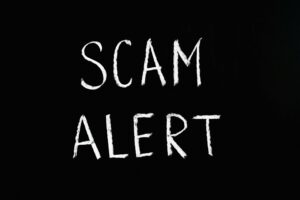How DBS Check Scams Work
Fraudsters use various tactics to make their dbs check scams appear legitimate. Here are the most common methods:
1. Fake Job Adverts
Scammers often post adverts on job boards, social media, or even create entire websites pretending to be recruitment agencies whereby the roles may initially appear appealing, are frequently vague; and at the same time, they promise flexible hours, competitive pay, and a quick start. Furthermore, because these enticing perks are paired with unclear job details, they can create a false sense of urgency. As a result, applicants are more likely to proceed without carefully verifying the offer, which increases the risk of falling victim to the scam.
2. Instant Job Offers
Rather than going through a proper recruitment process, victims are often told that they have “secured the job” after only minimal, or sometimes even no, vetting which pushes applicants into handing over money quickly.
3. Upfront Payments
Applicants are told they must pay for a DBS check before they can start. Fraudsters often charge inflated fees- sometimes £100 or more- and ask for payment via bank transfer, which is difficult to trace or recover.
4. “Expedited” or Discount Services
Scammers claim they can provide a “fast-track” DBS check for a reduced fee. In reality, there is no legitimate fast-track service available to the public.
5. Copycat Websites
Fraudulent websites misuse the DBS logo and official language to appear genuine. Some even use domains that look similar to GOV.UK. Once payment is made, either no check is carried out, or only a Basic check is provided when a Standard or Enhanced check was promised.

What Is a DBS Check?
A DBS check is an official background check carried out by the Disclosure and Barring Service. Depending on the role, there are three main levels:
-
Basic DBS- Shows unspent convictions only.
-
Standard DBS- Includes spent and unspent convictions, cautions, warnings, and reprimands.
-
Enhanced DBS- The most detailed check, including local police records and information relevant to safeguarding.
Employers are responsible for requesting the appropriate level of check for the role. Importantly, individuals cannot apply for a Standard or Enhanced check themselves- this must go through an employer or authorised body.
This is where confusion often arises and scammers step in.
Real-Life Examples
These scams aren’t just theoretical- they have real victims.
-
Amanda’s Story (Birmingham): Amanda applied for what looked like a legitimate holiday company job. She was offered the role immediately and told to pay for a DBS check via a third-party site. Before handing over money, she researched the company and discovered multiple scam reports.
-
Sami’s Story (Exeter): Sami was promised a quick start in a role if he paid £15.99 for an “expedited DBS check.” The site disappeared after payment, leaving him out of pocket.
-
National Trading Standards Case: In 2017, Marcus Ashcroft-Jones was jailed for running several fake DBS check websites tied to bogus jobs. He made thousands of pounds from unsuspecting jobseekers.
These cases highlight how scammers exploit the urgency of job hunting.
Red Flags to Watch Out For
If you’re applying for jobs, look out for these warning signs:
- Upfront payment requests – especially via bank transfer.
- Inflated costs – official DBS fees are currently £21.50 (Standard), £49.50 (Enhanced). Anything far higher should ring alarm bells.
- “Fast-track” or “discounted” DBS offers – these do not exist through official channels.
- No interview process – if you’re offered a job without proper vetting, it may not be real.
- Vague job adverts – poorly written, with little detail about responsibilities or employer.
- Misuse of logos – scammers often copy the DBS or GOV.UK logos.
- Wrong level of DBS requested – if a casual retail job asks for Enhanced DBS, that’s a red flag.
How to Stay Safe
The good news is, there are simple steps to protect yourself:
For Jobseekers
- Know who pays – In many cases, employers arrange and pay for DBS checks, although some may ask employees to reimburse later.
- Use official channels – Only apply via GOV.UK or an authorised responsible organisation.
- Verify the employer – Research the company, check contact details, and confirm the job offer is genuine before handing over money or documents
- Guard your data – Never share passport scans, bank details, or other sensitive information unless you are 100% sure the employer is legitimate.
- Report scams – If you suspect fraud, contact Action Fraud or JobsAware.
For Employers
- Be transparent – Make it clear in job adverts whether a DBS check is required and who will cover the cost.
- Educate candidates – Warn applicants not to apply for checks via third-party sites.
- Use authorised providers – Always process checks via GOV.UK or trusted umbrella bodies.
- Monitor your brand – Watch out for scammers impersonating your company in job adverts.
Why These Scams Work
Understanding why people fall victim can help you avoid the same pitfalls:
-
Urgency: Jobseekers are often desperate for quick employment and may overlook red flags.
-
Authority: Fraudsters use official logos, job titles, and email addresses to appear credible.
-
Confusion: Many people don’t know the difference between Basic, Standard, and Enhanced checks- scammers exploit this knowledge gap.
By slowing down and verifying each step, you can protect yourself.
Cavity DBS Costs (for reference)
-
- Standard – £21.50
- Enhanced – £49.50
- Admin Fee – £13.50 + VAT (if more than 3 we will reduce to £12.00 + VAT each)
- Document Verification – £13.50 + VAT
Any company charging far more than this should be questioned carefully. Some legitimate providers add a small admin fee, but excessive costs are suspicious.
What To Do If You’ve Been Scammed
If you think you’ve fallen victim:
-
Stop all communication with the scammer.
-
Contact your bank immediately to try to block or recover the payment.
-
Report the scam to Action Fraud – the UK’s national fraud reporting centre.
-
Alert the DBS if their logo or name is being misused.
-
Change your passwords and monitor your credit report if you’ve shared personal data.
Conclusion
DBS checks are a vital safeguarding tool, but scammers are exploiting them to trick jobseekers out of money and data. By recognising the warning signs- upfront payments, fake websites, unrealistic job offers- you can avoid becoming a victim.
Always use official channels, question unusual requests, and share this information with others. The more awareness there is, the harder it becomes for fraudsters to succeed.
